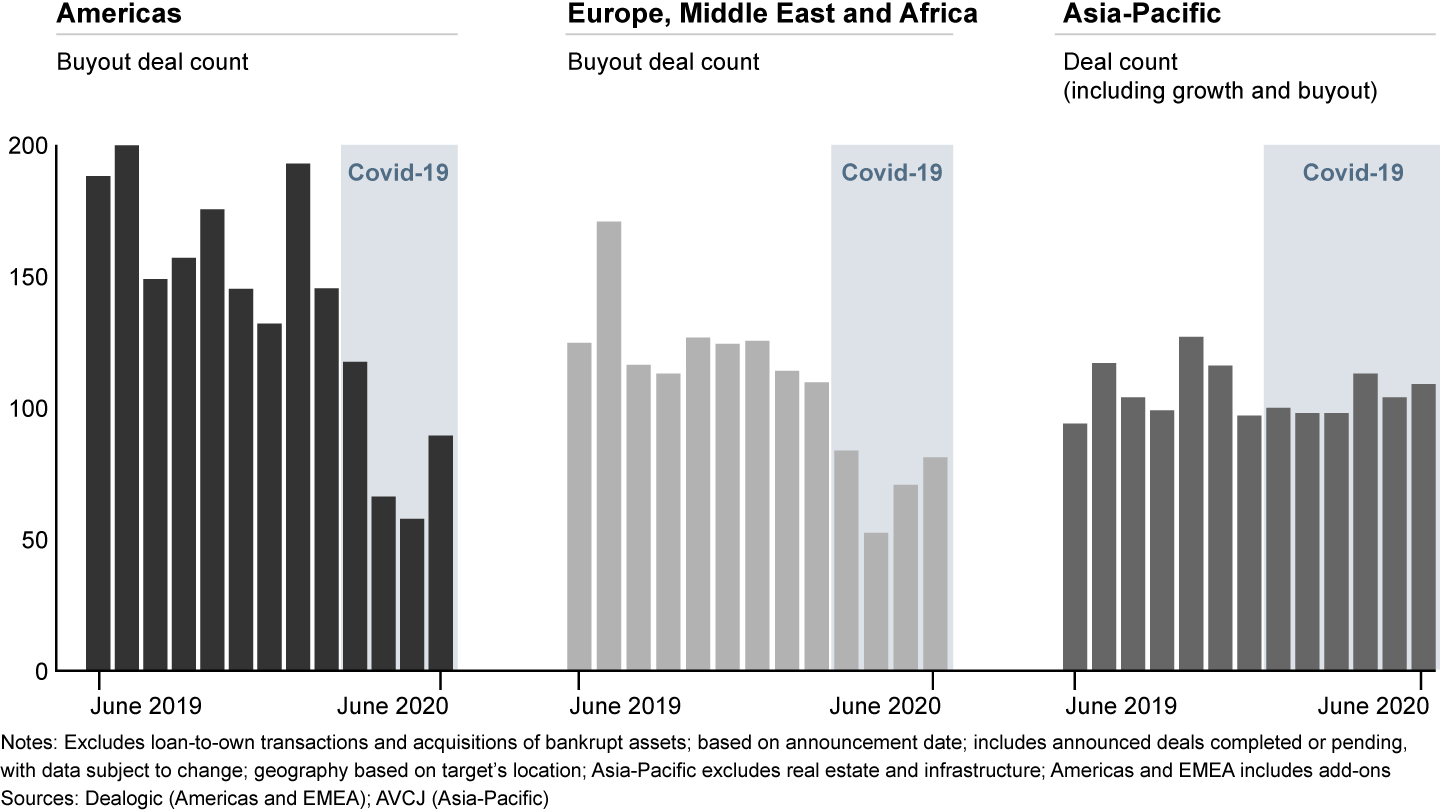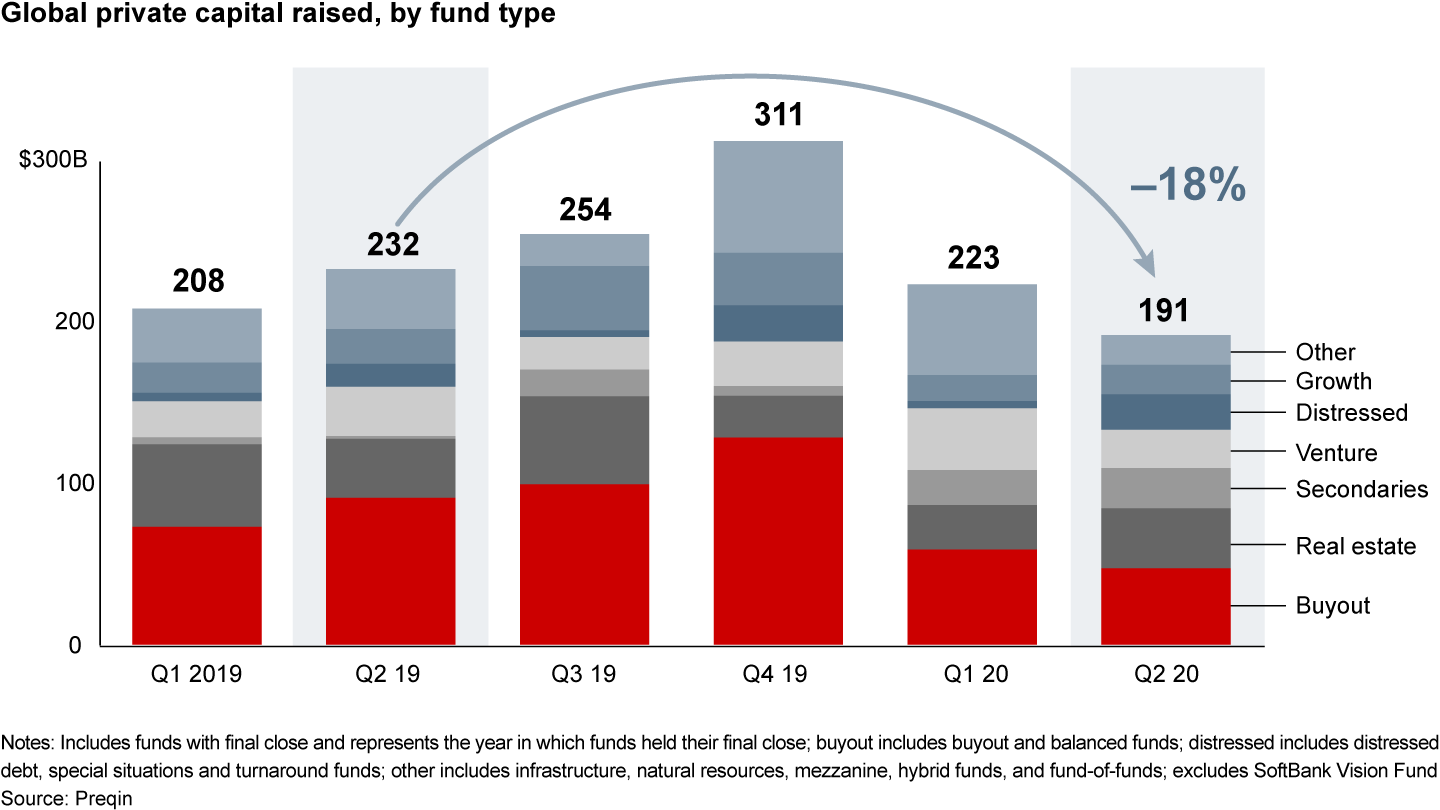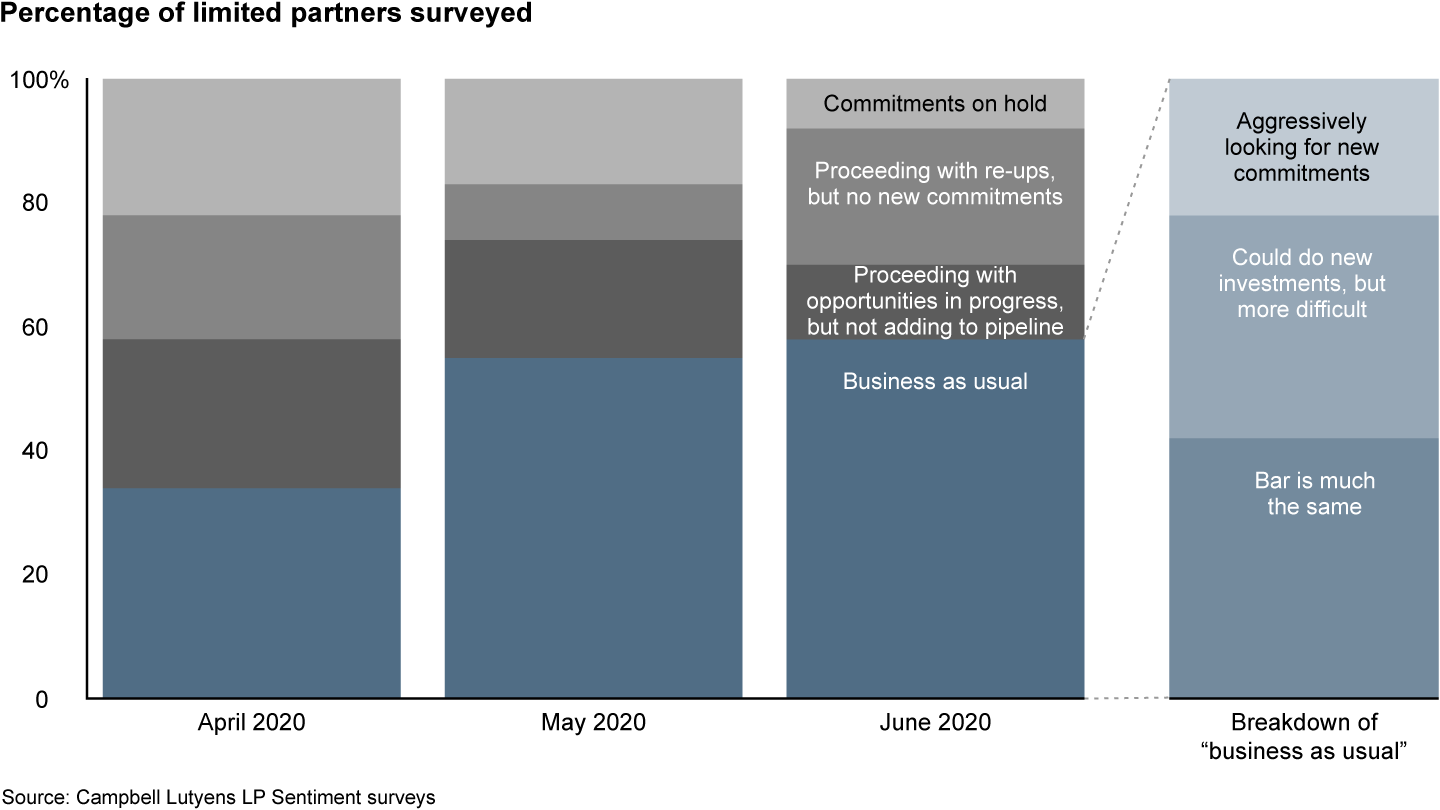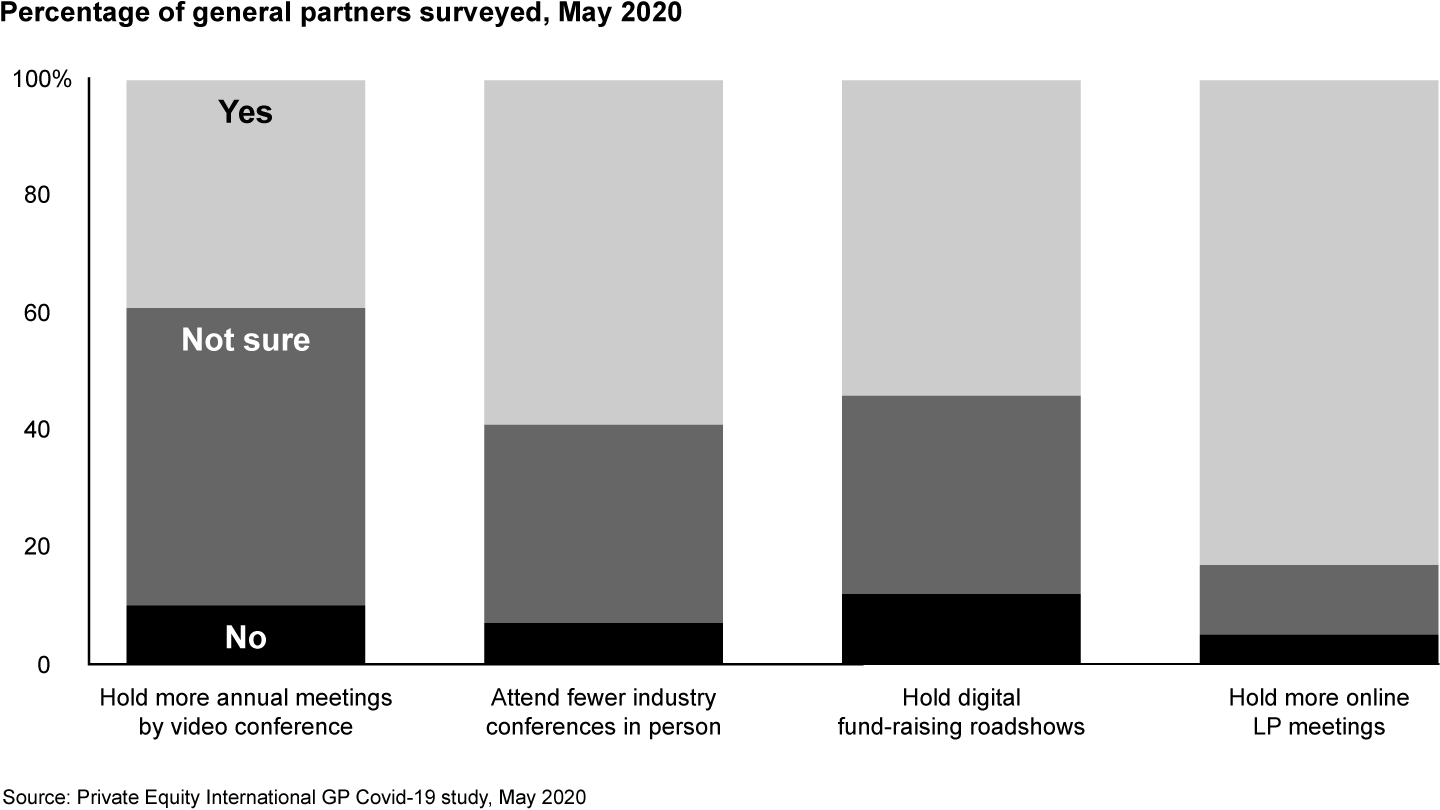Report

At the halfway point of an historically challenging year, private equity firms are getting back to business.
First-half deal count dropped 36% in the Americas and 34% in Europe, the Middle East and Africa (EMEA), compared with the first six months of 2019 (see Figure 1). Yet after an initial shock-and-awe period related to the Covid-19 pandemic, general partners (GPs) are clearly back in the market seeking out opportunities to buy assets at the cycle’s nadir.
June deal activity ticked up convincingly in the Americas and EMEA after dropping precipitously early in the pandemic. June deal count was also trending upward in China, although Asia-Pacific overall is more muddled because of the varied pandemic effects and responses in different countries.


Dealmaking still has a long way to go to reach prepandemic levels, yet Bain & Company’s due diligence activity suggests momentum is building across the market. As the largest provider of due diligence to private equity firms worldwide, Bain’s diligence work can be seen as a leading indicator for dealmaking globally. After steep declines from March through May, June due diligence work rebounded sharply, and there’s optimism that investment will pick up in the second half of the year. That could change, of course, given the unpredictable nature of the pandemic; investigating deals is no guarantee of closing them. But the bump up in diligence is a strong indication that GPs are actively in the hunt and looking to put money to work.
Lessons learned
The relatively quick turnaround in animal spirits marks a stark contrast with private equity activity in the wake of the 2008–2009 global financial crisis, when deal numbers lagged for years. Several reasons account for the difference. First, the industry is sitting on $2.6 trillion in unspent capital, or more than twice the amount it had at the start of the last recession. That capital has a clock on it, meaning GPs are looking to do deals. Second, there’s ample incentive to put money to work now. As the industry learned after the last recession, smart investments made near the bottom of the cycle tend to produce above-average returns if you move decisively. Indeed, the window to find assets at deeply distressed prices may already have closed; public equity and debt markets have both posted strong recoveries off their Covid-related lows.
That’s because investors generally believe that this downturn is different in kind than the last one. While the global financial crisis exposed vast structural problems with the global banking system, the Covid-19 shock has been more like a natural disaster. It’s a powerful externality that will undoubtedly have major economic impact, but doesn’t reflect underlying weakness in demand. Real risk remains that the Covid-19 effect on consumer activity will last long enough to morph into a financial crisis. But so far, the market is betting on something more benign.
Reluctance to exit
There’s no question, however, that the ongoing uncertainty is gnawing at both buyer and seller confidence. Market volatility and hard questions about how much consumer behavior has changed in various industries make it difficult to develop conviction around valuations. Investors are assessing how much Covid-19 is affecting customer demand right now and what demand will look like as the economic downturn and subsequent recovery run their course. Armed with little reliable data in a constantly shifting environment, it’s no wonder that buyers and sellers might have difficulty agreeing on what any company is worth right now. That shows up in the anemic market for exits, which are depressed across the globe. More than 80% of all GPs in a recent Investec survey say they don’t expect to make a portfolio exit over the next 12 months. Pressure to sell will build eventually, given many consecutive years of strong dealmaking. But for now, firms are unlikely to exit at a discount unless they absolutely have to.
LPs regain confidence
Compared with dealmaking and exits, fund-raising held up relatively well over the year’s first half. That’s largely because funds closed during the first two quarters benefited from capital committed before the Covid-19 pandemic struck. Capital raised globally in the first quarter actually surpassed 2019 levels, but fell off 18% from a year earlier in the second quarter (see Figure 2).


It remains to be seen how much capital limited partners (LPs) will commit in the second half as the Covid-19 crisis drags on. But their mood has actually been improving. When Campbell Lutyens surveyed LPs in April, 22% of them said commitments were on hold, and only 34% said they were proceeding with “business as usual.” By June, those percentages had shifted to 8% and 58%, respectively, as LPs adjusted to the new reality (see Figure 3).


Their increasing confidence reflects a couple of things. First, rebounding equity markets have restored balance to the asset mix in LP portfolios, making it easier to allocate new capital to private equity. Second, worries about liquidity have eased, partly because LPs know they can turn to a healthy secondaries market if needed. Finally, LPs remain committed to the asset class over the long term and recognize the importance of maintaining a steady pace of commitments to diversify vintage years. LPs clearly have their guard up, however. They’ll undoubtedly be more selective than ever with their commitments, sticking with proven winners and taking fewer risks.
Three emerging trends
As private equity firms try to make the best of a period of unprecedented tumult, we see three clear implications from the Covid-19 crisis so far:
Sector expertise is more important than ever. Figuring out how Covid-19 is reshaping industries is probably the most difficult challenge GPs face as they think through the long-term effect on their portfolios. If you don’t have deep sector expertise, getting to the right answer is going to be difficult. Sector specialists have strong domain knowledge, industry contacts and many repetitions in their chosen industry. That allows them to see past financial engineering to create lasting business value. Expertise will be even more important as firms try to understand the discontinuities caused by Covid-19. Assessing the health and prospects of both target and portfolio companies will depend on it.
In retail healthcare, for instance, the widespread deployment of telemedicine has raised real questions about what routine service delivery will look like in the years ahead. Some patients will prefer to continue online visits where medically appropriate, meaning providers will suddenly find themselves in the technology game. Determining how much behavior will change and how quickly providers must adapt will require nuanced analysis of company-specific exposure to industry-specific dynamics. To invest with confidence, firms will need a sophisticated understanding of what customers value, how the industry needs to pivot, and how management can deliver new kinds of services in the highest-quality way. For a generalist, those insights are hard to come by.
Your value-creation plan may be obsolete. With so much changing so fast, fund managers need to fundamentally reevaluate every business plan in their portfolios. What are the pivotal things you believed were going to create value in this business, and are they still true? Consider the impact on a thin-margin business like retail grocery. Having tried out online delivery during the pandemic, many customers are likely to decide that they really liked having groceries delivered and will seek out providers that can do so reliably and affordably in the future. Even if the percentage is small, losing those customers could be devastating for a store operating on the edge.
But many grocery chains have found that online ordering is structurally less profitable than in-store transactions—and in many cases, each order comes at a loss. Investments in things like automated fulfillment centers and the IT to support a strong online customer experience will be a critical part of adding value and gaining market share in the future. But if you owned a US grocery chain six months ago, you probably weren’t accelerating these investments because you didn’t really have to. In the wake of Covid-19 that’s changed; the future is now.
Welcome to the digital world. For all of the digital sophistication of its practitioners, the business of private equity is stubbornly analog. Everything is on paper, and every meeting is in person. How often do you jump on a plane and devote two days of travel to a one-hour meeting? Covid-19 and technologies like Zoom or Microsoft Teams have forced us to radically change these behaviors, and we’ve seen in recent months that going virtual works just fine in many cases. Knowing that talent is their most constrained resource, many firms have rethought their business models to see how they can be more productive. A survey in May by Private Equity International, for instance, shows that GPs are generally open to using video conferencing for a number of interactions they’ve traditionally done in person (see Figure 4).


This is also forcing a review of what technology can do for the entire investment value chain, from sourcing deals, to monitoring portfolio companies, to assessing exit opportunities. Instead of waiting around for the next confidential memorandum to come through the door, for example, firms are mining rivers of information to find companies with the characteristics they like and the kinds of issues they have experience dealing with. Those companies may not be available for sale now, but by targeting what they want and going after it proactively, firms can begin a dialogue with potential targets and see what transpires.
Increasingly, firms are using data, artificial intelligence, machine learning and automation to find companies, conduct due diligence, underwrite risk more comfortably and do it faster. Firms that aren’t moving in this direction risk being left behind.